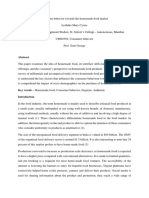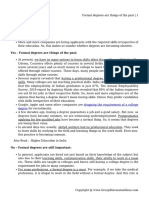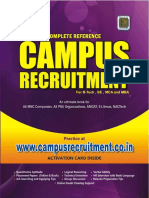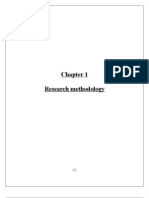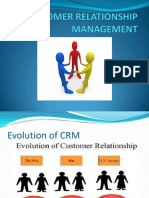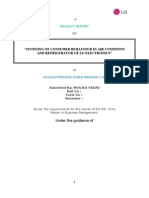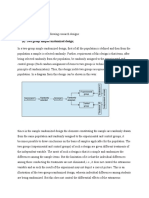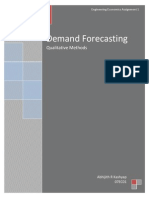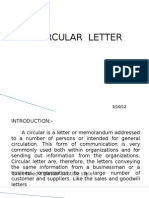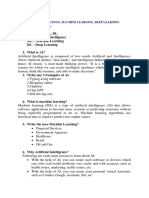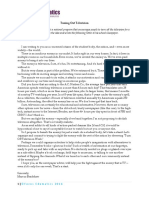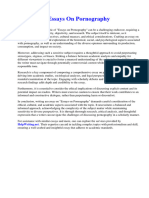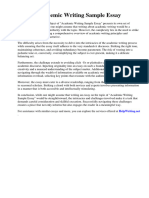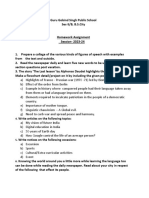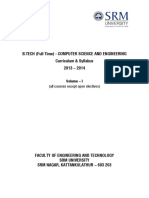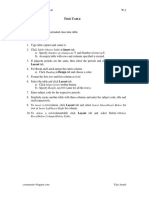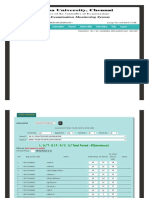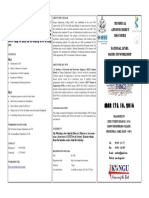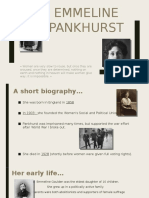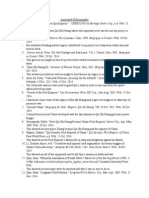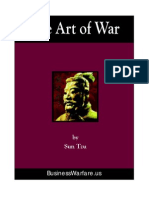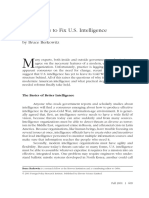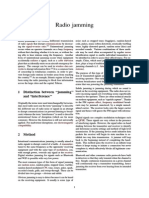Reading Screening Paper 3 - 2016-17
Reading Screening Paper 3 - 2016-17
Uploaded by
rishikarthickCopyright:
Available Formats
Reading Screening Paper 3 - 2016-17
Reading Screening Paper 3 - 2016-17
Uploaded by
rishikarthickCopyright
Available Formats
Share this document
Did you find this document useful?
Is this content inappropriate?
Copyright:
Available Formats
Reading Screening Paper 3 - 2016-17
Reading Screening Paper 3 - 2016-17
Uploaded by
rishikarthickCopyright:
Available Formats
Tuning Out Television
Marcus has been reading about a national program that encourages people to turn off the television for a
full week. He was intrigued by the idea and wrote the following letter to his school newspaper.
Dear Editor,
I am writing to you as a concerned citizen of the student body, the nation, and—even more
widely—the world.
There is an insidious enemy in our midst. It lurks right in our very homes. In fact, it lives in
multiple rooms in our households. Even worse, we've invited the enemy in. We've even paid
money to bring it into our lives.
The enemy is television. Sure, it's fun. It's entertaining. And it's hard to imagine our lives
without it.
But its very charm is part of the problem. We're entranced by it. There it sits, warmly lit and
beckoning with its moving images and inviting voices and music.
The minute we succumb to its wiles, it attacks our motivation and our creativity. It gobbles
and swallows up our time and energy in enormous gulps.
Did you know that according to the A.C. Nielsen Co., the average time per year that each
American spends watching television is more than 4 hours each day? That translates into 28
hours per week, which is more than many part-time jobs. In larger terms, that means 2 months
of nonstop TV-watching per year. In a 65-year life span, that is 9 years under the enemy's spell.
As a collective, the number of hours of television watched annually by Americans equals 250
billion. Astounding, the effect the enemy has on us. We don't ever get that time back.
Sure, television can certainly be educational and informative. However, there are so many
other options now for news—from the old-school, trusty newspapers (like this one), to the high-
tech, instant access to the Internet. Besides, are those 4+ hours per day spent in front of PBS and
CNN? I don't think so.
But we can fight the enemy—especially if we band together. I'm not proposing to abolish
television altogether. That's not really realistic.
As an avid addict to all kinds of action-packed dramas like 24 and CSI, it would be
hypocritical of me to say it's acceptable for me to watch but not you or anyone else.
So I propose to banish the enemy for just a week. As a student body, let's take a stand. Let's
organize and commit to trying to fight the enemy with the rest of the nation by observing "Turn
Off Television Week."
Perhaps we could organize activities to help stoke people's imaginations with alternatives to
television. Remember books—glorious books? Such a wealth of information at our fingertips,
ready to pick up and take with us anywhere. No electricity needed, no plugs or glazed-over
eyes as a side effect. Maybe a book exchange, field trips to museums, or talking to one another
instead of flipping the channels. What if we tuned in to each other and our community instead
of the enemy box?
I hope you, as the newspaper editor, will help join the fight against the enemy that is TV—
even if it's only for one week. That's a start.
Sincerely,
Marcus Bradshaw
1|©Focus Edumatics 2016
1. Read these sentences from the essay.
Remember books—glorious books? Such a wealth of information at our fingertips, ready to pick
up and take with us anywhere.
The word "wealth" suggests that the information in books is
A. plentiful.
B. valuable.
C. expensive.
D. portable.
2. What does "insidious" mean in this essay?
A. deceitful
B. surprising
C. harmless
D. inside
3. What best describes the way the author ends the essay?
A. by telling a short story
B. with a personal attack
C. with a call to action
D. by threatening the editor
4. From what perspective does the author write this essay?
A. balanced
B. concerned
C. hypocritical
D. neutral
2|©Focus Edumatics 2016
5. What can the reader conclude about Marcus?
A. Marcus is shy and nervous about making his voice heard.
B. Marcus thinks the television has a negative effect on people.
C. Marcus wishes many more people would watch television.
D. Marcus does not see or understand any other perspectives.
6. How does the author engage the reader at the beginning of the essay?
A. by personifying the issue as an enemy
B. by describing the issue with an example
C. by giving surprising statistics as support
D. by appealing to only a specific audience
7. What is the purpose of this essay?
A. to persuade people to fight a battle against news stations
B. to get a letter to the editor printed in the school newspaper
C. to convince people to spend a week without television
D. to show how important writing and reading books are
Justice for All?
Saboteurs?
Prejudice against Asian immigrants had been longstanding on the West Coast. However, it
increased when World War II broke out following the Japanese attack on Pearl Harbor. Within a
few weeks, the demand spread that Japanese Americans, both naturalized citizens and those
born in the United States, be removed from the West Coast. The belief was that they might be
"saboteurs" or "spies." It made no difference that there was no proof that even one was a threat
to the United States.
Relocation Orders
On February 19, 1942, President Roosevelt signed Executive Order 9066 authorizing the
Secretary of War to designate parts of the country as "military areas." Any and all persons could
be excluded, and travel restrictions might be imposed. A few weeks later, General John L.
3|©Focus Edumatics 2016
DeWitt, Western Defense Command leader, made the entire Pacific coast a military area
because of its vulnerability to attack.
Curfews were established, and Japanese Americans were at first prohibited from leaving the
area. And then they were prohibited from being in the area. The only way Japanese Americans
could follow these contradictory orders was to "evacuate" to relocation centers.
In the relocation program, 110,000 men, women, and children were sent to what were in
essence prison camps. This program was the most serious invasion of individual rights by the
federal government in the nation's history. The entire operation operated on the racist belief
that anyone of Japanese ancestry was a traitor.
Court Cases
In wartime, the old saying goes, law is silent. The Supreme Court, which had only recently
begun to play a stronger role in protecting minority rights, did not want interfere with what the
administration considered necessary. Three cases testing the constitutionality of the evacuation
orders were heard by the Court. In the first case, Hirabayashi v. United States (1943), the Court
upheld the curfew, but avoided ruling on the wider implications of relocation.
In the second case, Korematsu v. United States, the Court could no longer ignore whether loyal
citizens could be relocated to detention camps solely based on their race. A majority of the
Court agreed with Justice Black's view that military necessity justified the relocation. However,
three members of the Court, Frank Murphy, Owen J. Roberts, and Robert H. Jackson, dissented.
On the same day, the Court unanimously authorized a writ of habeas corpus for Mitsuye
Endo, a citizen whose loyalty had been clearly established. The Court's rulings
in Hirabayashi and Korematsu were criticized by many civil libertarians and scholars from the
start. There has been a general condemnation of them ever since.
Justice in the 'Court of History'
After the war ended, the internment haunted the nation's conscience. In 1948, Congress took
the first step in making amends. It enacted the Japanese American Evacuation Claims Act to
provide some compensation to those who had lost homes and businesses. In 1980, Congress
again opened the internment issue. This time, witnesses testified, many of them for the first
time, of the hardships and trauma they had suffered. The resulting report, which was called
Personal Justice Denied (1983), condemned the removal as unjustified. The report also
concluded that the Supreme Court decisions had been "overruled in the court of history."
8. According to the following thesaurus entry, what best describes the antonym forrelocation?
Main Entry: transfer
Part of Speech: noun
Definition: possession change
Synonyms: alteration, assignment, conduction, convection,
deportation, displacement, move, relegation, relocation,
removal, shift, substitution, transference, translation,
transmission, transmittal, transposition, variation
4|©Focus Edumatics 2016
Antonyms: hold, keeping
A. keeping
B. possession
C. transmission
D. transfer
9. What best describes the author's perspective?
A. The author is informative but biased occasionally.
B. The author is clearly biased against Japanese Americans.
C. The author is mostly neutral and unconcerned about history.
D. The author is biased toward justifying the relocation camps.
10. What best summarizes the first paragraph?
A. The United States had a prejudiced past during World War II.
B. The United States treated Japanese Americans with respect.
C. The United States protected Pearl Harbor from credible threats.
D. The United States had a long history of fairness and tolerance.
11. Based on the first paragraph, what can the reader conclude?
A. Asian immigrants had always been treated fairly on the West Coast.
B. Demand decreased for Japanese Americans to be removed from the West Coast.
C. Naturalized citizens of Japanese descent were not considered "saboteurs."
D. Americans did not trust the Japanese after the attack on Pearl Harbor.
12. What does the word saboteurs mean in this passage?
A. Americans
B. spies
C. foreigners
D. citizens
5|©Focus Edumatics 2016
13. What is the main idea of the passage?
A. Congress should support monetary compensation for Japanese Americans who
were interned.
B. The Supreme Court can make decisions that reverse shameful decisions made in
U.S. history.
C. World War II resulted in over 100,000 Japanese Americans being interned in the U.S.
D. Two court cases resulted in reversing the relocation of over 100,000 Japanese
Americans in the United States.
14. According to the following dictionary entry, what is the origin of the phrase habeas corpus?
ha·be·as cor·pus
–noun Law.
a writ requiring a person to be brought before a judge or court, esp. for investigation of a
restraint of the person's liberty, used as a protection against illegal imprisonment.
[Origin: < L: lit., have the body (first words of writ), equiv. to habeās 2nd sing. pres. subj. (with
impv. force) of habére to have + corpus body]
A. illegal imprisonment
B. have the body
C. judge or court
D. personal liberty
15. What is the word root of prejudice?
A. pre
B. before
C. judge
D. dice
6|©Focus Edumatics 2016
16. Which genre best describes this passage?
A. fiction
B. persuasion
C. editorial
D. nonfiction
17. Which sentence uses correct parallel structure?
A. The class will learn knitting, quilting, and how to sew a garment.
B. Enrique promises to arrive on time and to work with a smile.
C. Be sure to bring water, a hat, and bring plenty of sun block.
D. Mom bakes a cake, buys a present, and can hang up decorations.
18. Which sentence uses affect or effect correctly?
A. Jeremy's injury will affect the outcome of the game.
B. The weather will not effect me if I stay indoors.
C. A good persuasive essay can effect the reader's opinion.
D. Your protest has no affect on my final decision.
19. Which sentence uses correct subject-verb agreement?
A. The audience have laughed at all your jokes.
B. One of the books is about the history of Japan.
C. He don't have to stay late after school today.
D. Each one of the cheerleaders get a new uniform.
20.
When Stacy saw Patty she said Did you hear about that house fire on Garland Street?
What is the correct way to punctuate the sentence above?
A. "When Stacy saw Patty, she said, Did you hear about that house fire on Garland
7|©Focus Edumatics 2016
Street?"
B. When Stacy saw Patty, "she said, Did you hear about that house fire on Garland
Street"?
C. When Stacy saw Patty, she said, Did you hear about that house fire on "Garland
Street?"
D. When Stacy saw Patty, she said, "Did you hear about that house fire on Garland
Street?"
21. Which word in this sentence needs to be capitalized?
The juniors at my high school have to take a history class and write a report about the Louisiana
purchase.
A. purchase
B. juniors
C. history
D. report
Mending Wall
by Robert Frost
Something there is that doesn't love a wall,
That sends the frozen-ground-swell under it,
And spills the upper boulders in the sun,
And makes gaps even two can pass abreast.
The work of hunters is another thing:
I have come after them and made repair
Where they have left not one stone on a stone,
But they would have the rabbit out of hiding,
To please the yelping dogs. The gaps I mean,
No one has seen them made or heard them made,
But at spring mending-time we find them there.
I let my neighbor know beyond the hill;
And on a day we meet to walk the line
And set the wall between us once again.
We keep the wall between us as we go.
To each the boulders that have fallen to each.
And some are loaves and some so nearly balls
We have to use a spell to make them balance:
"Stay where you are until our backs are turned!"
We wear our fingers rough with handling them.
Oh, just another kind of out-door game,
One on a side. It comes to little more:
8|©Focus Edumatics 2016
There where it is we do not need the wall:
He is all pine and I am apple orchard.
My apple trees will never get across
And eat the cones under his pines, I tell him.
He only says, "Good fences make good neighbors."
Spring is the mischief in me, and I wonder
If I could put a notion in his head:
"Why do they make good neighbors? Isn't it
Where there are cows?
But here there are no cows.
Before I built a wall I'd ask to know
What I was walling in or walling out,
And to whom I was like to give offence.
Something there is that doesn't love a wall,
That wants it down." I could say "Elves" to him,
But it's not elves exactly, and I'd rather
He said it for himself. I see him there
Bringing a stone grasped firmly by the top
In each hand, like an old-stone savage armed.
He moves in darkness as it seems to me,
Not of woods only and the shade of trees.
He will not go behind his father's saying,
And he likes having thought of it so well
He says again, "Good fences make good neighbors."
22. What is the theme of this poem?
A. Differences can be overcome with hard work.
B. Good neighbors assist each other in tasks.
C. Borders can add security and interaction.
D. Barriers can both protect and isolate.
23. What does the poet mean in the following line from the poem?
He is all pine and I am apple orchard.
A. He wants to emphasize two similar views.
B. He wants to show how people are like trees.
C. He wants to tell the reader that he is right.
D. He wants to contrast two different views.
9|©Focus Edumatics 2016
24. From the speaker's reaction to the wall, the reader can conclude that
A. he is unhappy with having a wall.
B. he is confused that the wall needs mending.
C. he is satisfied by repairing the wall.
D. he is calm when faced with problems.
25. Why does the speaker repeat the following two lines?
Something there is that doesn't love a wall,
"Good fences make good neighbors."
A. to remind the reader of similar perspectives
B. to highlight different perspectives
C. to refocus the poem on the neighbor's conflict
D. to create a clear, consistent rhythm
10 | © F o c u s E d u m a t i c s 2 0 1 6
You might also like
- Bombing Format - 053231Document5 pagesBombing Format - 053231Paty Noah Roldan100% (8)
- SCO Internship ReportDocument18 pagesSCO Internship ReportSadaf JavedNo ratings yet
- Aptitude Sample PDFDocument6 pagesAptitude Sample PDFAJ ChaudharyNo ratings yet
- A1286728257 - 13891 - 25 - 2017 - MCQ Questions CSE101Document60 pagesA1286728257 - 13891 - 25 - 2017 - MCQ Questions CSE101Jnaneswar Reddy Sabbella0% (1)
- Shoppers' Stop - Employee FocusDocument2 pagesShoppers' Stop - Employee FocusPallavi PrakashNo ratings yet
- PrefaceDocument7 pagesPrefaceVaishali PatialNo ratings yet
- Power Electronics Short Questions and AnswersDocument21 pagesPower Electronics Short Questions and AnswersPalak Ariwala75% (4)
- 400+ (UPDATED) ECE Interview Questions and Answers 2019Document26 pages400+ (UPDATED) ECE Interview Questions and Answers 2019M Sachin Kumar100% (1)
- Group DiscussionDocument13 pagesGroup DiscussionRitesh ChatterjeeNo ratings yet
- Conclusion of ODDocument2 pagesConclusion of ODWayne Simmons100% (1)
- Employability Skills - Module 1 - MCQDocument33 pagesEmployability Skills - Module 1 - MCQjacksparrowbennyNo ratings yet
- Consumer Behavior Towards The Homemade Food MarketDocument13 pagesConsumer Behavior Towards The Homemade Food Market27. Jyothika MaryNo ratings yet
- Presentation On Seven CsDocument36 pagesPresentation On Seven Csprateekc2967% (3)
- Projective Technique: Business Research MethodsDocument25 pagesProjective Technique: Business Research MethodsSandhya DubeyNo ratings yet
- Précis Writing ExamplesDocument2 pagesPrécis Writing Examplesmahesh100% (1)
- Formal Degrees Are Things of The PastDocument3 pagesFormal Degrees Are Things of The PastWeird BeardsNo ratings yet
- Amity PPT TemplateDocument30 pagesAmity PPT TemplateAkriti Sharma0% (2)
- Campus Recruitment BookDocument103 pagesCampus Recruitment BookPradip Erande100% (1)
- Case Study DTHDocument2 pagesCase Study DTHNawazish KhanNo ratings yet
- ProjectDocument136 pagesProjectNeha GuptaNo ratings yet
- Implant Training Report FormatDocument40 pagesImplant Training Report FormatVinoth Vkr100% (1)
- Final ReportDocument32 pagesFinal ReportNeha SinghNo ratings yet
- Concept of Frequency Reuse ChannelsDocument6 pagesConcept of Frequency Reuse ChannelsNamrata Dhamal100% (1)
- CRM Unit 4 PDFDocument58 pagesCRM Unit 4 PDFRavikrishna NagarajanNo ratings yet
- Ajeet (LG Project)Document60 pagesAjeet (LG Project)Manish Chugh100% (1)
- Project ReportDocument17 pagesProject ReportAshu PoojariNo ratings yet
- (A) Two Group Simple Randomized DesignDocument7 pages(A) Two Group Simple Randomized Designrubyna aryal100% (2)
- Requirement of Intelligent WebsitesDocument12 pagesRequirement of Intelligent WebsitesSheetal Saini100% (1)
- A Industrial Visit ReportDocument9 pagesA Industrial Visit ReportDeepak Sharma50% (2)
- Submitted By: "Smart Garbage Collection System"Document27 pagesSubmitted By: "Smart Garbage Collection System"Dhruv BhargavaNo ratings yet
- Replacement ProblemDocument2 pagesReplacement ProblemYassin Usman100% (3)
- Co Lab Manual IIDocument48 pagesCo Lab Manual IITanvi JainNo ratings yet
- Mdu Mba 4tb Sem b2b Marketing ModelDocument1 pageMdu Mba 4tb Sem b2b Marketing ModelK Memcha SinghaNo ratings yet
- Difference Between Sampling and Non-Sampling Error (With Comparison Chart) - Key DifferencesDocument7 pagesDifference Between Sampling and Non-Sampling Error (With Comparison Chart) - Key DifferencesYatin BhardwajNo ratings yet
- Solar Based Home Automation SystemDocument7 pagesSolar Based Home Automation SystemHamza MunibNo ratings yet
- Sun Direct DTH Project Work.Document52 pagesSun Direct DTH Project Work.Pranav JhaNo ratings yet
- Meghalaya Rural Bank Job Notification - Officer in Jr. Management, Office Asst PostsDocument7 pagesMeghalaya Rural Bank Job Notification - Officer in Jr. Management, Office Asst PostsCareerNotifications.comNo ratings yet
- Case StudyDocument1 pageCase Studyujjal das0% (4)
- Qualitative Methods of Demand ForecastingDocument14 pagesQualitative Methods of Demand ForecastingSriharsha Pidaparthi0% (1)
- Infowiz ReportDocument54 pagesInfowiz ReportAjit SharmaNo ratings yet
- Implementation of MIS in Wipro: Group 9Document17 pagesImplementation of MIS in Wipro: Group 9Satyam SharmaNo ratings yet
- Introduction To Sampling Methods: 2.2.1 Finite Population and Infinite PopulationDocument11 pagesIntroduction To Sampling Methods: 2.2.1 Finite Population and Infinite PopulationBhawna JoshiNo ratings yet
- Rani Channamma University, Belgaum Question Papers of Different Subjects-1 PDFDocument250 pagesRani Channamma University, Belgaum Question Papers of Different Subjects-1 PDFmani_bushan100% (2)
- GD - Freedom Is A MythDocument1 pageGD - Freedom Is A MythRohitNo ratings yet
- Consumer Behaviour QuestionnaireDocument4 pagesConsumer Behaviour QuestionnaireAhmad Adnan100% (2)
- Company Profile: Kannan Departmental StoreDocument7 pagesCompany Profile: Kannan Departmental Storeanjesh387041No ratings yet
- BC PPT On Circular LetterDocument8 pagesBC PPT On Circular LetterSajid ..No ratings yet
- Industrial Visit Report Electrical FINALDocument13 pagesIndustrial Visit Report Electrical FINALyagnesh0% (1)
- Digital Fluency Notes Chapter Wise 2023Document16 pagesDigital Fluency Notes Chapter Wise 2023shrinivasvp03No ratings yet
- Reading Screening Paper 1 - 2016-17Document10 pagesReading Screening Paper 1 - 2016-17rishikarthick100% (1)
- Essay On World War 1Document8 pagesEssay On World War 1hixldknbf100% (2)
- Thesis United StatesDocument4 pagesThesis United Statesbsk561ek100% (2)
- When Reporters Cross the Line: The Heroes, the Villains, the Hackers and the SpiesFrom EverandWhen Reporters Cross the Line: The Heroes, the Villains, the Hackers and the SpiesNo ratings yet
- Essays On PornographyDocument5 pagesEssays On Pornographyafibzdftzaltro100% (2)
- San Isidro, Nueva Ecija TELEFAX (044) 940-61-81 / E-Mail:: General de Jesus CollegeDocument3 pagesSan Isidro, Nueva Ecija TELEFAX (044) 940-61-81 / E-Mail:: General de Jesus CollegeJennifer Garcia EreseNo ratings yet
- Thesis of Pearl Harbor Address To The NationDocument7 pagesThesis of Pearl Harbor Address To The Nationsharonrobertseverett100% (2)
- Academic Writing Sample EssayDocument53 pagesAcademic Writing Sample Essayb725c62j100% (2)
- General Education PRCDocument30 pagesGeneral Education PRCherma joyce colomaNo ratings yet
- Assignment - HHW Class 12Document8 pagesAssignment - HHW Class 12Killer ẞunnyNo ratings yet
- Thesis Statement For Flags of Our FathersDocument8 pagesThesis Statement For Flags of Our Fathersafjrydnwp100% (1)
- Btech Syll Cse r2013-14Document245 pagesBtech Syll Cse r2013-14rishikarthickNo ratings yet
- Jayabal Palanisamy Male R.Palaniamy P.Rajammal Abinaya Karunanithi Female K.karunanithi K.kalaiyarasiDocument7 pagesJayabal Palanisamy Male R.Palaniamy P.Rajammal Abinaya Karunanithi Female K.karunanithi K.kalaiyarasirishikarthickNo ratings yet
- Reading Screening Paper 1 - 2016-17Document10 pagesReading Screening Paper 1 - 2016-17rishikarthick100% (1)
- Ug Degree CertificateDocument1 pageUg Degree CertificaterishikarthickNo ratings yet
- SEPM LAB Questions1Document18 pagesSEPM LAB Questions1rishikarthickNo ratings yet
- Ex. No. 1b T T: Insert Table in Insert TabDocument2 pagesEx. No. 1b T T: Insert Table in Insert TabrishikarthickNo ratings yet
- Rathinam Technical Campus (Institute of Technology) Eachanari, Coimbatore - 641021Document2 pagesRathinam Technical Campus (Institute of Technology) Eachanari, Coimbatore - 641021rishikarthickNo ratings yet
- Reading Screening Paper 1 - 2016-17Document10 pagesReading Screening Paper 1 - 2016-17rishikarthick100% (1)
- CS6551Document103 pagesCS6551rishikarthick0% (1)
- CD LabDocument14 pagesCD LabrishikarthickNo ratings yet
- Unit - II Understanding Internet BasicsDocument24 pagesUnit - II Understanding Internet BasicsrishikarthickNo ratings yet
- C SyntaxDocument14 pagesC SyntaxrishikarthickNo ratings yet
- Home Student Detail Faculty Detail Examina뛕 Reports Admin U뛕 Entry Status Help LogoutDocument9 pagesHome Student Detail Faculty Detail Examina뛕 Reports Admin U뛕 Entry Status Help LogoutrishikarthickNo ratings yet
- Question BankDocument16 pagesQuestion BankrishikarthickNo ratings yet
- Technical Announcement Brochure: Is About To Change It All Over Again."Document1 pageTechnical Announcement Brochure: Is About To Change It All Over Again."rishikarthickNo ratings yet
- Sri Vidya: Lesson Plan For Linear Data StructuresDocument59 pagesSri Vidya: Lesson Plan For Linear Data StructuresrishikarthickNo ratings yet
- Chapter 18Document35 pagesChapter 18rishikarthickNo ratings yet
- CS2357 Set3Document8 pagesCS2357 Set3rishikarthickNo ratings yet
- IR and IPDocument9 pagesIR and IPMasud ParvezNo ratings yet
- Itinerary BagoCityDocument28 pagesItinerary BagoCityMARY ROSENo ratings yet
- Emmeline PankhurstDocument6 pagesEmmeline PankhurstMoreau LauraNo ratings yet
- Facebook Emailtwitter: 11 Things From Philippine History Everyone Pictures IncorrectlyDocument16 pagesFacebook Emailtwitter: 11 Things From Philippine History Everyone Pictures Incorrectlycharls xyrhen BalangaNo ratings yet
- AnnotatedbibliographyyyDocument2 pagesAnnotatedbibliographyyyapi-272917743No ratings yet
- Essay On War Against TerrorismDocument9 pagesEssay On War Against TerrorismShehzad KhawarNo ratings yet
- TEST 1.2&3 Sec. 1 Mr.Mostafa Abd El-Aal (darsenglizy.com موقع درس انجليزي)Document3 pagesTEST 1.2&3 Sec. 1 Mr.Mostafa Abd El-Aal (darsenglizy.com موقع درس انجليزي)Walid AhmedNo ratings yet
- Book ReviewDocument2 pagesBook ReviewKILO TANGONo ratings yet
- Get Dunkirk 1940 Operation Dynamo First Edition Douglas C. Dildy Free All ChaptersDocument84 pagesGet Dunkirk 1940 Operation Dynamo First Edition Douglas C. Dildy Free All Chaptersjhorgemmani100% (7)
- Dio's History of Rome Vol 1-35Document166 pagesDio's History of Rome Vol 1-35api-26150079No ratings yet
- Stammbuch Klein GB 03Document89 pagesStammbuch Klein GB 03b46550214949No ratings yet
- TugassssssssssssDocument19 pagesTugassssssssssssNdapNo ratings yet
- Military - British Army - His Majesty's Loyalists, & Indian AlliesDocument238 pagesMilitary - British Army - His Majesty's Loyalists, & Indian AlliesThe 18th Century Material Culture Resource Center89% (9)
- Relic KnightsDocument25 pagesRelic KnightsAlex HoodNo ratings yet
- Rani DurgavatiDocument3 pagesRani DurgavatiSneha ShastriNo ratings yet
- Student Guide: Lesson 9: Rome's Expansion and CrisisDocument5 pagesStudent Guide: Lesson 9: Rome's Expansion and CrisisJuan Antonio Ochoa VillaNo ratings yet
- WOMEN KNOW THY SELF, by David SinclairDocument4 pagesWOMEN KNOW THY SELF, by David SinclairKat MurrayNo ratings yet
- The Art of WarDocument39 pagesThe Art of Warfernandobeno100% (7)
- The Boy in Striped Pajamas BACKGROUNDDocument23 pagesThe Boy in Striped Pajamas BACKGROUNDAlley Kitty BooNo ratings yet
- King Kong Script VODocument13 pagesKing Kong Script VOBennyNo ratings yet
- Better Ways To Fix US Intelligence - BerkowitzDocument11 pagesBetter Ways To Fix US Intelligence - BerkowitzFelipeMgrNo ratings yet
- BAHI 09 Block 01Document37 pagesBAHI 09 Block 01Poco ChanNo ratings yet
- Backyard Camping ProgrammeDocument2 pagesBackyard Camping ProgrammeWize Dee100% (1)
- Radio JammingDocument5 pagesRadio JammingMehdi ThkNo ratings yet
- The Prelude To Bolshevism - Kerensky (1919)Document345 pagesThe Prelude To Bolshevism - Kerensky (1919)Steve Allan100% (3)
- (Go Igo Baduk Weiqi) (Eng) Openig Theory Made Easy - Otake HideoDocument88 pages(Go Igo Baduk Weiqi) (Eng) Openig Theory Made Easy - Otake HideoMargaret Tinsay100% (3)
- Instant Download Herakles and Hercules Exploring A Graeco Roman Divinity Louis Rawlings PDF All ChapterDocument84 pagesInstant Download Herakles and Hercules Exploring A Graeco Roman Divinity Louis Rawlings PDF All Chapterwaalciene100% (13)
- Sika Poxitar F PDFDocument7 pagesSika Poxitar F PDFHung TrieuNo ratings yet
- Alfred Tennyson: Ulysses IntroductionDocument14 pagesAlfred Tennyson: Ulysses IntroductionDevidas KrishnanNo ratings yet











